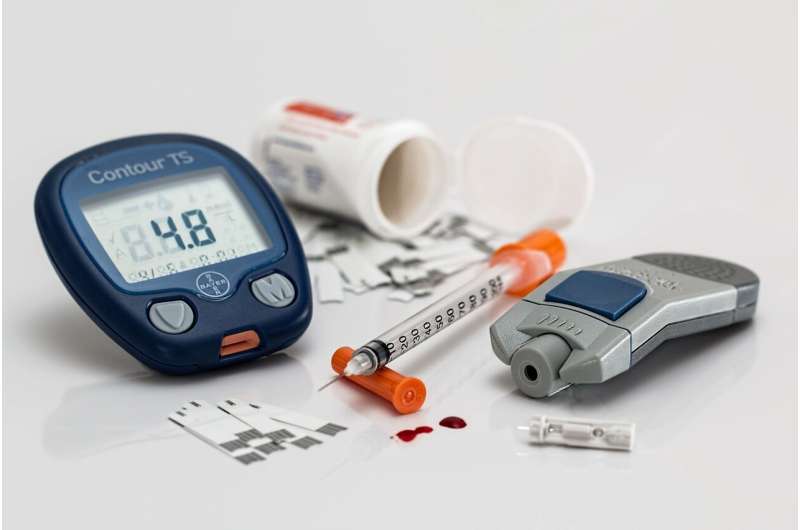This article has been reviewed according to Science X's editorial process and policies. Editors have highlighted the following attributes while ensuring the content's credibility:
fact-checked
trusted source
proofread
Tirzepatide as effective at treating early-onset type 2 diabetes as diabetes diagnosed later in life, research finds

Tirzepatide is as effective at treating early-onset type 2 diabetes (T2D), a more aggressive form of the condition that normally responds less well to treatment, as it is at treating T2D diagnosed later in life, new research being presented at the Annual Meeting of the European Association for the Study of Diabetes (EASD) in Hamburg, Germany (2–6 Oct) has found.
Tirzepatide belongs to a new class of drugs that mimic the effect of two hormones involved in blood sugar control and appetite suppression, glucagon-like peptide-1 (GLP-1) and glucose-dependent insulinotropic polypeptide (GIP).
The drug, a once-weekly injection, was approved as T2D treatment in the US in May 2022 and was recently (September 2023) given approval as a treatment for some people with T2D in England.
T2D, the most common form of diabetes, usually occurs in middle-aged and older people. However, onset at a younger age is becoming more common globally. Young-onset T2D or early-onset type 2 diabetes (EOT2D, diagnosis before the age of 40) is more aggressive. The insulin-producing beta cells in the pancreas deteriorate more quickly in people with EOT2D than those with later-onset T2D.
Evidence for this includes data from the SURPASS program. In this series of clinical trials designed to assess tirzepatide's potential as a treatment for T2D, those with young-onset T2D were in worse overall health than those with later-onset T2D. Despite being younger, those with early-onset T2D had higher blood sugar levels, higher mean body weight and BMI and higher levels of blood fats that increase the risk of cardiovascular disease, than those with later-onset T2D.
Individuals with early-onset T2D also respond less well to treatments. Despite this, there has been little research on the management of the condition.
Professor Melanie Davies, of the University of Leicester, Leicester UK, and colleagues in the US used data from the SURPASS program (SURPASS-1, -2, -3 and -5) to assess the effect of tirzepatide on glycemic control, body weight and cardiometabolic markers in EOT2D. Three different doses of tirzepatide were tested in SURPASS: 5mg, 10mg and 15mg.
The analysis compared changes in mean HbA1c (average blood sugar level), body weight and cardiometabolic markers including waist circumference (WC), lipids and blood pressure in participants with young-onset (N=873, 20.5%) and later-onset T2D (N=3,394, 79.5%) after 40 or 52 weeks of treatment with tirzepatide.
Tirzepatide was found to be equally effective in young and later-onset T2D. It led to similar improvements in HbA1c and body weight in young and later-onset T2D at Week 40/52 at all three doses. Tirzepatide (all doses) also improved waist circumference, lipids (triglycerides and HDL) and systolic blood pressure similarly in both groups.
Professor Davies concludes, "Early-onset type 2 diabetes is not only more aggressive, it usually responds less well to drugs, which means our findings are really encouraging. Further research is now needed to evaluate whether starting treatment with tirzepatide and similar drugs early improves long-term outcomes in this important group."




















